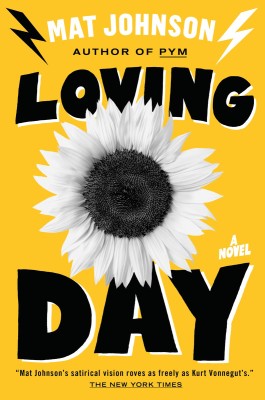From LOVING DAY by Mat Johnson. Copyright (c) 2015 by Mat Johnson. Reprinted by arrangement with Random House, an imprint of The Random House Publishing Group, a division of Penguin Random House, Inc. All rights reserved.
~
IN THE GHETTO THERE IS A MANSION and it is my father’s house. It sits on seven acres, surrounded by growling row homes, frozen in an architectural class war. Its expansive lawn is utterly useless, wild like it smokes its own grass and dreams of being a jungle. The street around it is even worse: littered with the disposables no one could bother to put in a can, the cars on their last American owner, the living dead roaming slow and steady to nowhere. And this damn house, which killed my father, is as big as it is old, decaying to gray pulp yet somehow still standing there, with its phallic white pillars and the intention of eternity. An eighteenth-century estate in the middle of the urban depression of Germantown. Before he died, my father bought the wreck at auction, planned on restoring it to its original state, just like he did for so many smaller houses in the neighborhood. Rescuing a slice of colonial history to sell it back to the city for a timeless American profit. His plan didn’t include being old, getting sick, or me having to come back to this country, to this city, to pick up his pieces. This house is a job for a legion, not one person. It would kill one person. It did—my father. I am one person now. My father’s house is on me. I see it from the back of the cab, up on its hill, rotting.
Donated by the Loudin family after the Depression, the mansion was used by the city as a museum until a fire that created repair costs beyond its means and interest. At one point in my life, decades before, I was a boy. As such, I knew this house. I used to ride the 23 trolley past its absurd presence and marvel at this artifact of rich white folks’ at- tempt at dynasty. A physical memory of historic Germantown’s pastoral roots, before the larger city of Philadelphia exploded past this location, propelled by the force of the industrial revolution. Most things from childhood get smaller with age, but Loudin Mansion towers, because now I have to take care of it. So I want to run. I sit passively in the taxi as I’m driven closer, but my thighs ache and my bowels are prepared to evacuate, and I want to open the door and run. I’ll run. I’ll run through North Philly if I have to, all the way downtown. Run along the highway back to the airport, then run away again from the whole damn country.
The white cabdriver makes no move to get out with me when he finally stops, just pops the trunk open with one button and with another relocks the doors after I open mine. That lock clicks hard. I’m on the street with my bags, and I can’t get back inside. I’m not white, but I can feel the eyes of the few people outside on me, people who must think that I am, because I look white, and as such what the hell am I doing here? This disconnect in my racial projection is one of the things I hate. It goes in a subcategory I call “America,” which has another sub- heading called “Philly.” I hate that because I know I’m black. My mother was black—that counts, no matter how pale and Irish my father was. So I shall not be rebuked. I will not be rejected. I want to run but I refuse to be run off.
A kid walks by, about seventeen, not much younger than I was when I escaped this neighborhood. He looks up, and as I lift my bags I give him the appropriate local response, an expression that says I’m having a bad life in general and a headache right now. Welcome home. There are blocks around here where you can be attacked for looking another man in the eyes, and other blocks where you can be assaulted for not giving the respect of eye contact. I could never figure it, which blocks were which, until I realized these were just the excuses of socio- paths. The sociopaths, that’s the real problem. The whole street demeanor is about pretending to be a sociopath as well, so that the real ones can’t find you.
When I get to the porch, the front door opens. I can hear it creak before I see someone emerging from behind its paint-cracked surface. Sirleaf Day is carpeted in cloth. He’s got a Kenyan dashiki, Sudanese mudcloth pants, and a little Ghanian kente hat. It’s like Africa finally united, but just in his wardrobe. Last time I saw him, he dressed the same, but he only had one leather medallion. Now he has enough to be the most decorated general in the Afrocentric army. I give him a “Howyadoin,” and the Philly salute, a hummingbird-like vibration of my forehead, the most defensive of nods. He gives me a hug. He hugs me like he knows I’m trying to get away.
.



